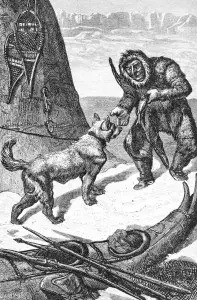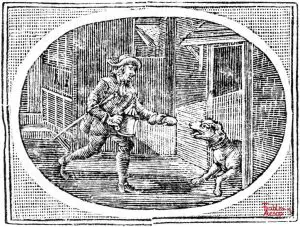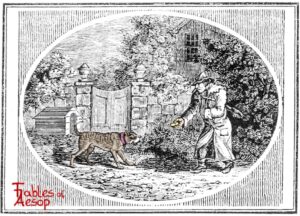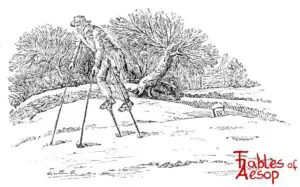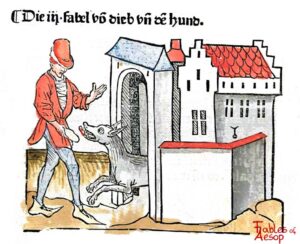A Thief brought meat to calm a guard Dog. The Dog recognized the ploy and told the Thief he would now be a better guard.
Be true to your master.

JBR Collection
A Thief who came near a house one night to rob it, was very much annoyed at finding a stout Dog in the courtyard, who kept up a loud and steady bark. To quiet him he threw him a tempting piece of meat, whereupon the Dog exclaimed, “When first you came, I fancied you might be a Thief: now that you try to bribe me from my duty, I am sure you are one; and I shan’t leave off barking while you remain about the premises.”

Townsend version
A thief came in the night to break into a house. He brought with him several slices of meat in order to pacify the Housedog, so that he would not alarm his master by barking. As the Thief threw him the pieces of meat, the Dog said, “If you think to stop my mouth, you will be greatly mistaken. This sudden kindness at your hands will only make me more watchful, lest under these unexpected favors to myself, you have some private ends to accomplish for your own benefit, and for my master’s injury.”

Samuel Croxall
A THIEF coming to rob a certain house in the night, was disturbed in his attempts by a fierce vigilant Dog, who kept barking at him continually. Upon which the Thief, thinking to stop his mouth, threw him a piece of bread: but the Dog refused it with indignation; telling him, that, before, he only suspected him to be a bad man; but now, upon his offering to bribe him, he was confirmed in his opinion; and that, as he was intrusted with the guardianship of his master’s house, he should never cease barking while such a rogue as he lay lurking about it.
THE APPLICATION
A man who is very free in his protestations of friendship, or offers of great civility upon the first interview, may meet with applause and esteem from fools, but contrives his schemes of that sort to little or no purpose in the company of men of sense. It is a common and known maxim, to suspect an enemy even the more, for his endeavouring to convince us of his benevolence because the oddness of the thing puts us upon our guard and makes us conclude, that some pernicious design must be couched under so sudden and unexpected a turn of behaviour; but it is no unnecessary caution, to be upon the watch against even indifferent people, when we perceive them uncommonly forward in their approaches of civility and kindness. The man, who at first sight makes us an offer, which is due only to particular and well acquainted friends, must be either a knave, and intends by such a bait to draw us into his net; or a fool, with whom we ought to avoid having any communication. Thus far the consideration of this fable may be useful to us in private life; what it contains farther, in relation to the public, is, that a man, truly honest, will never let his mouth be stopped with a bribe; but the greater the ofter is which is designed to buy his silence, the louder, and more constantly will he open against the miscreants who would practise it upon him.

Thomas Bewick (The Thief and The Dog)
A Thief coming to rob a certain house in the night, was thwarted in his attempts by a fierce vigilant Dog, who kept barking at him continually. Upon which the Thief, thinking to stop his mouth, threw him a piece of bread; but the Dog refused it with indignation, telling him that before he only suspected him to be a bad man, but now upon his offering to bribe him, his suspicions were fully confirmed; and that as he was entrusted with the guardianship of his master’s house, he would never cease barking while such a rogue was lurking about it.
APPLICATION.
Nothing can alter the honest purpose of him whose mind is embued with good principles. He will despise an insidious bribe, and the greater the offer which is designed to buy his silence, the louder and more indignantly will he open out against the miscreant who would thus practise upon him. He knows that the favours held out to him are not marks of the love and regard of him who would confer them, but are meant as the price at which he is to sell his honour and his virtue. With a mind unpolluted, his noble resolution never fails to produce the happiest consequences, by preserving his friends and himself from the mischievous projects laid against them. So true it is, that virtue is its own reward; while corruption and venality are sure in the end to bring the greatest miseries on those, and their adherents, who are so base, or perhaps inconsiderate, as to subject themselves to future evils of the most fatal nature, for the sake of a little present profit.

L’Estrange version
As a gang of thieves were at work to rob a house, a mastiff took the alarum, and fell a baying: one of the company spoke him fair, and would have stopt his mouth with a crust: No, says the dog, this will not do, for several reasons. First, I’ll take no bribes to betray my master. Secondly, I am not such a fool, neither, as to sell the ease and liberty of my whole life to come, for a piece of bread in hand: for when you have rifled my master; pray who shall maintain me?
Moral
Fair words, presents, and flatteries are the methods of treachery in courts as well as in cottages; only the dogs are truer to their masters than the men.

Heinrich Steinhöwel (Of The Thief and The Dog)
